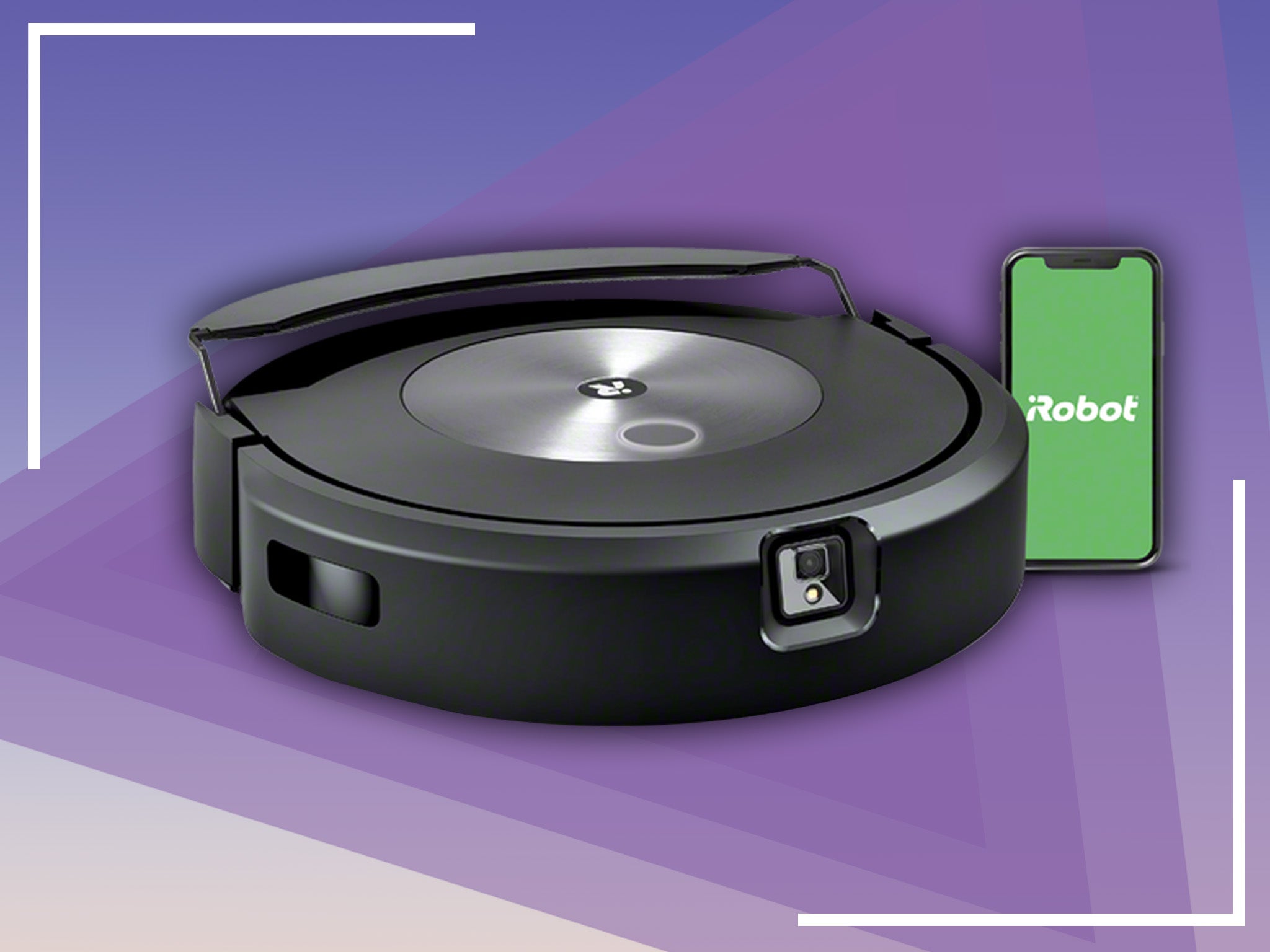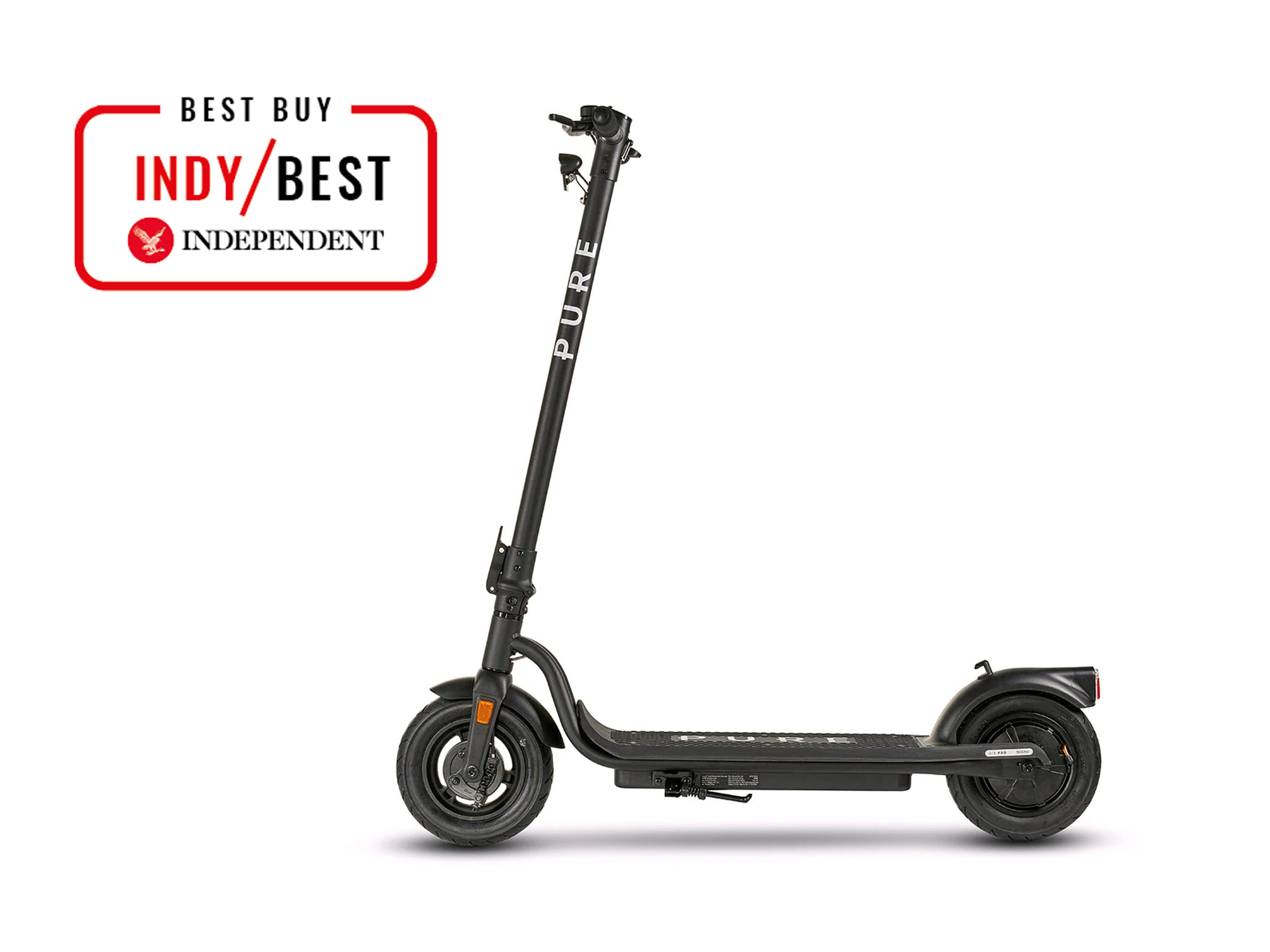
The Independent's journalism is supported by our readers. When you purchase through links on our site, we may earn commission. Why trust us?
7 best electric scooters for 2024, tried and tested
Glide with confidence on our pick of the top battery-powered scooters for all ages
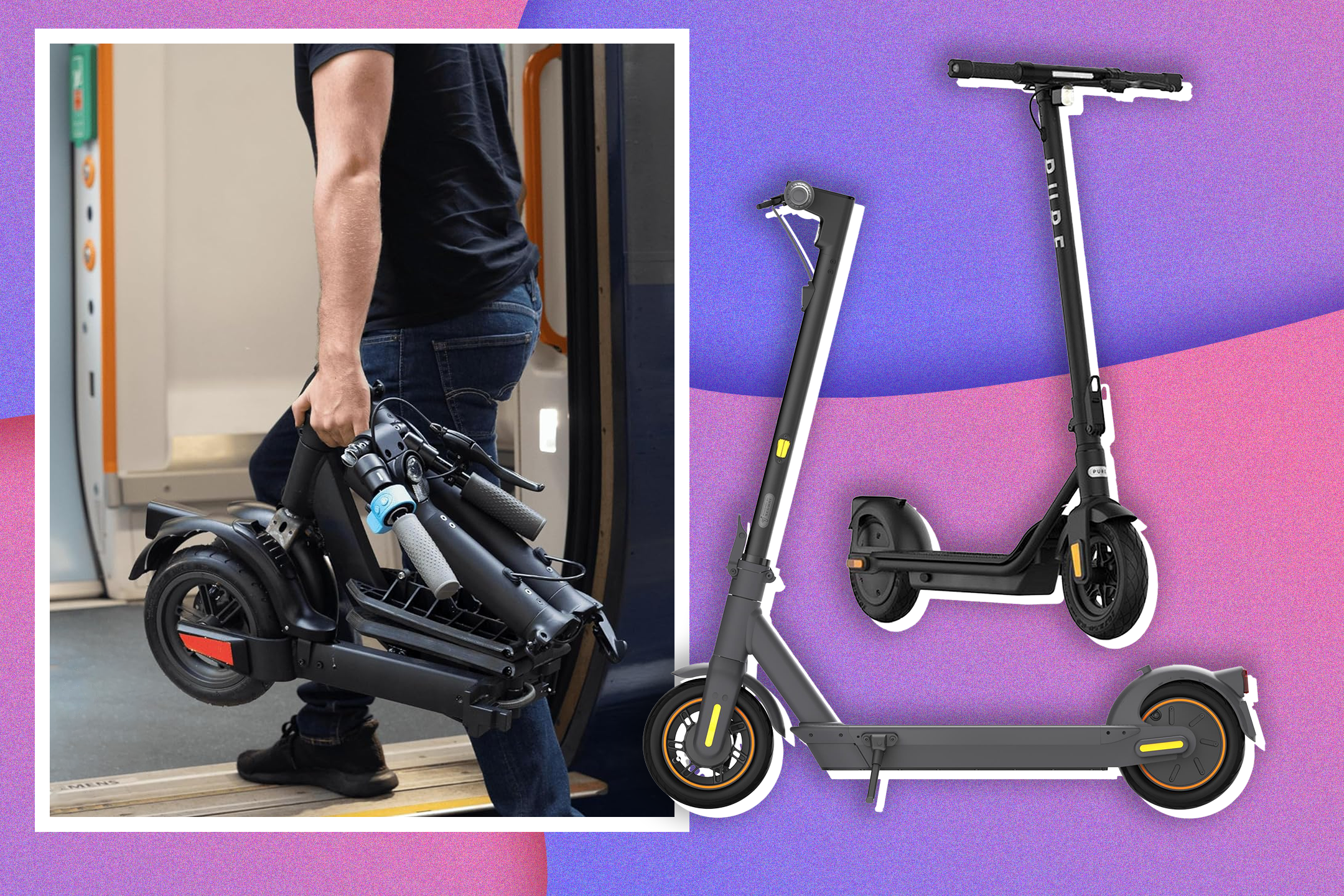
The best electric scooters are rated for their reliability, comfort, range and – above all – their safety. But while they might all look the same at first, not all electric scooters are created equal.
Despite their booming popularity, local laws have been slow to adapt to this emergent form of green transport. There are plans in the UK to regulate and authorise the use of private scooters on public streets, but until these new rules are implemented – and depending on where in the world you are – the e-scooters in our list are only permitted for use on private land. So always scoot responsibly.
Finding the best electric scooter for your needs depends on a range of factors. Does it have enough range to go the distance? Does it have durable tyres to cope with the road surfaces you ride on? Can the motor handle steep hills? Does it fold up easily and fit in the back of a Smart Fortwo?
Our list of the best electric scooters includes models to suit most riders: scooters with impeccable all-round performance, affordable models that don’t cut corners when it comes to quality and safety, and long-range models for those who want to ride for longer.
How we tested the best electric scooters
A big part of why electric scooters still occupy a legal grey area is simple regulation. There are real safety concerns too, as cheap and modified scooters from shady brands pose a fire risk. That’s why the e-scooters in our list are models we’ve tested from brands we know and trust, so you can be sure you’re making the right choice.
We’ve tested eight of the best electric scooters on the market, taking into consideration the range, comfort, portability and safety of each. Bear in mind that the ranges stated below are given by the manufacturer and measured under ideal conditions. Things like hills, the weight of the rider, your speed and the weather conditions can all make a big dent in the actual range. If we’ve found that the real-world range differs significantly from the advertised one, we’ll point it out.
The best electric scooter in 2024 is:
- Best overall – Pure air pro: £549, Pureelectric.com
- Best budget buy – Riley RS1: £299.99, Scan.co.uk
- Best folding option – Riley RS3: £439.97, Currys.co.uk
- Best lightweight option – Unagi model one: £899, Leisurelakesbikes.com
- Best for teenagers – Xiaomi mi 1S: £449.99, Amazon.co.uk
- Best for adults – Xiaomi mi pro 2: £479.99, Mi.com
Pure air pro

- Best: Overall
- Weight: 16.5kg
- Size: 116cm x 50cm x 119cm/51cm
- Range: 40km
- Charging time: 8.5h
- Power: 710W
- Tyres: 10in, air-filled puncture-resistant
- Why we love it
- Great performance on inclines
- Excellent build quality
- Weather resistant
The Pure Air Pro is built to withstand all kinds of miserable weather, with IP65 water resistance allowing you to plough straight through puddles rather than around them. Chunky 10in wheels and pneumatic tyres make for one of the most comfortable and least jittery rides of any of the scooters we’ve tested.
A fully upgraded version of the basic Pure Air electric scooter, the Pro weighs just half a kilo more and introduces a few improvements over the regular model. The front-wheel drive motor is a lot more powerful and races up inclines as if they weren’t there, while a larger battery and regenerative braking extends the battery life and boosts the maximum range to an impressive 25 miles.
The Pure Air Pro is a high-performance e-scooter and an excellent choice for anyone regularly riding across hilly terrain.
We tested the third edition of the Pure Air Pro, which has since been replaced by the fourth edition (£549, Purelectric.com) with improved power and handling. We’ll bring you our full review of the latest model once we’ve taken it for a test ride.
Riley Scooters RS3
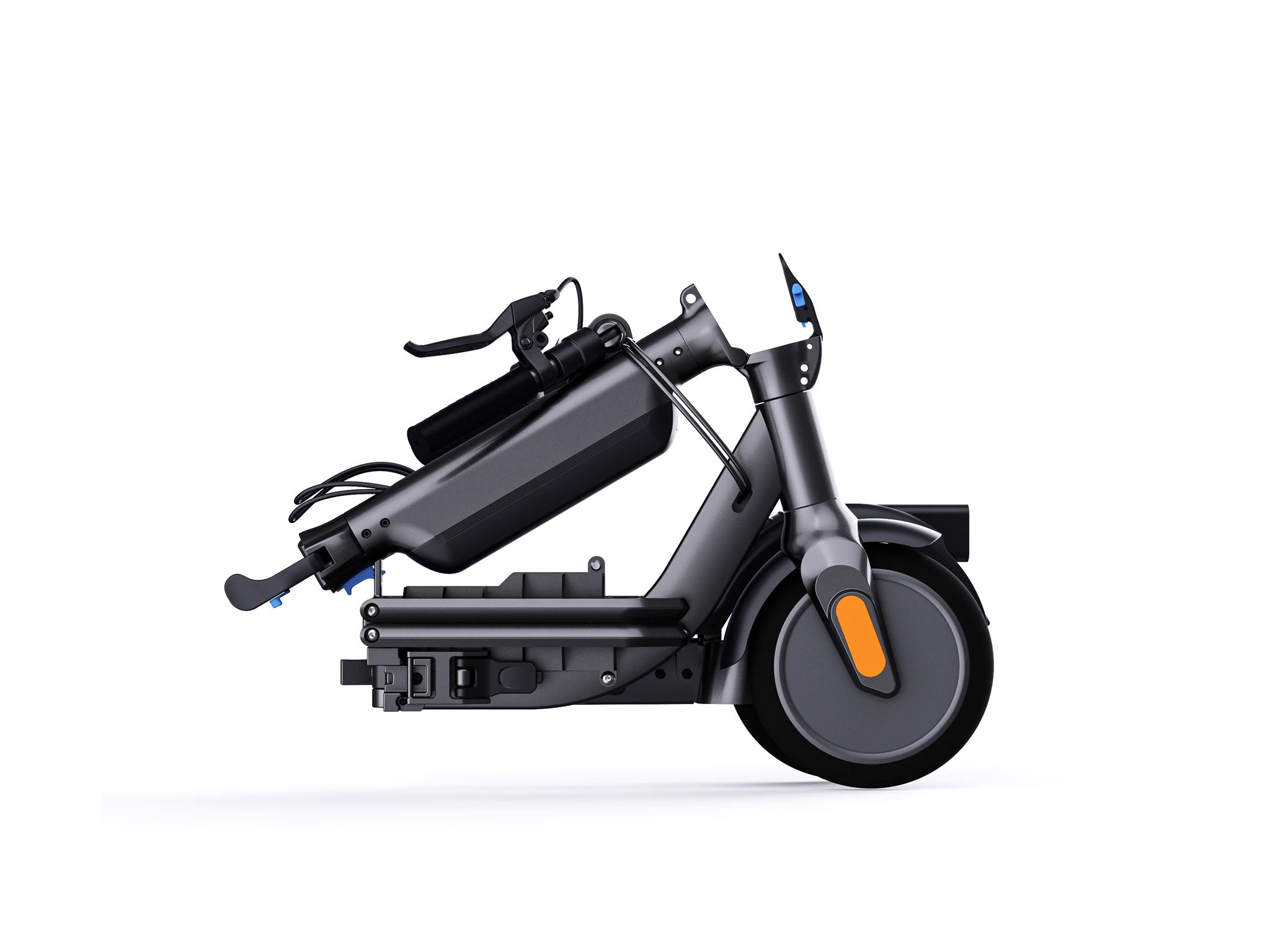
- Best: Folding electric scooter
- Weight: 14kg
- Unfolded size: 113cm x 17cm x 118cm
- Folded size: 65cm x 27cm x 47cm
- Range: 15.5m
- Charging time: 2 hours
- Power: 350W
- Tyres: 8.5in pneumatic air tyres
- Why we love it
- Folds down to compact shape
- Take note
- Folding mechanism is fiddly
If electric scooters are to play a role in the future of alternative urban transport, they’re going to look a lot like the Riley RS3. This is a truly portable electric scooter that folds down to the size of a small suitcase, meaning you can easily store it under your desk, stow it in a cloakroom, or take it on public transport.
Don’t expect Brompton-levels of engineering elegance when it comes to the folding action – it takes a bit of practice and a few video tutorials to get to grips with it – but the benefits of being able to collapse the RS3 down to half its size outweighs the clunkiness.
The unique folding design doesn’t compromise the overall ride quality either. The Riley RS3 uses premium disc brakes and electronic ABS for smooth and consistent braking, especially when riding downhill. The lightweight alloy frame feels reassuringly sturdy too, and the pneumatic tyres provide some comfort on poorly maintained roads.
Unagi Model One
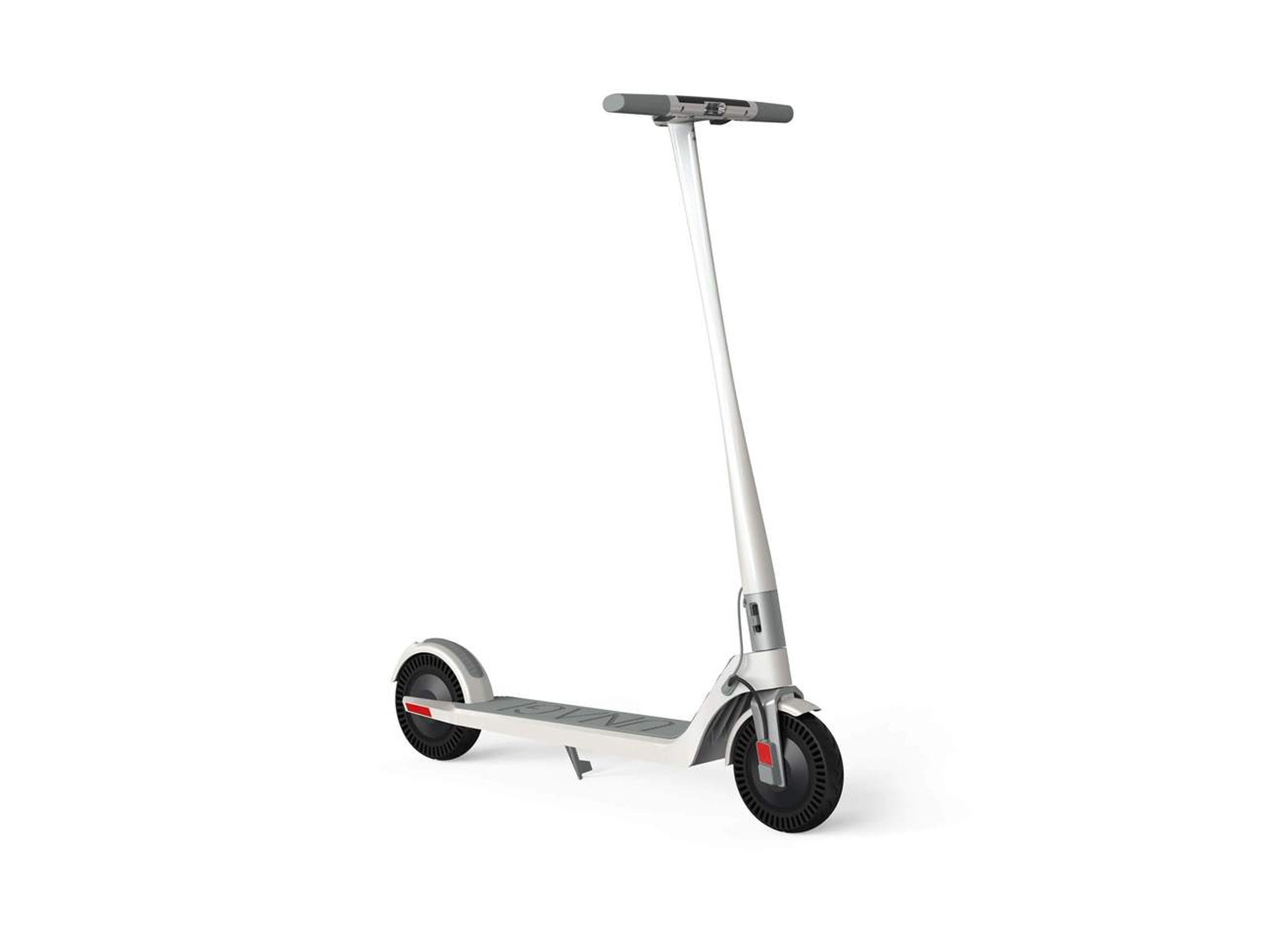
- Best: Lightweight electric scooter
- Weight: 12kg
- Size: 116cm x 50cm x 119cm/51cm
- Range: 15.5 miles
- Charging time: 5 hours
- Power: Dual 250W
- Tyres: 7.5in solid
- Why we love it
- Lightweight
- Easy to carry
- Take note
- Uncomfortable on rough surfaces
The lightest electric scooter we’ve tested, the Unagi Model One is a nippy little ride with a stylish magnesium alloy handlebar, integrated display and carbon fibre tubing. At just 12kg, it’s one of the most portable scooters on the market and sports a straightforward, single-click folding action, making it a superb choice for anyone who goes on regular rides and needs to store it in a car boot or luggage space.
To reduce the weight this much, Unagi has had to sacrifice some power output and restrict the battery size. That means it struggles on steeper inclines and has a relatively limited range compared to more heavy-duty scooters in our list. The Unagi model one’s range sits at around 15.5 miles, less than half of the long range Pure Air Pro LR (£549, Purelectric.com).
Those solid rubber tyres are puncture-proof, durable and well-suited to smooth roads, but will rattle your teeth on rough terrain.
Riley Scooters RS1
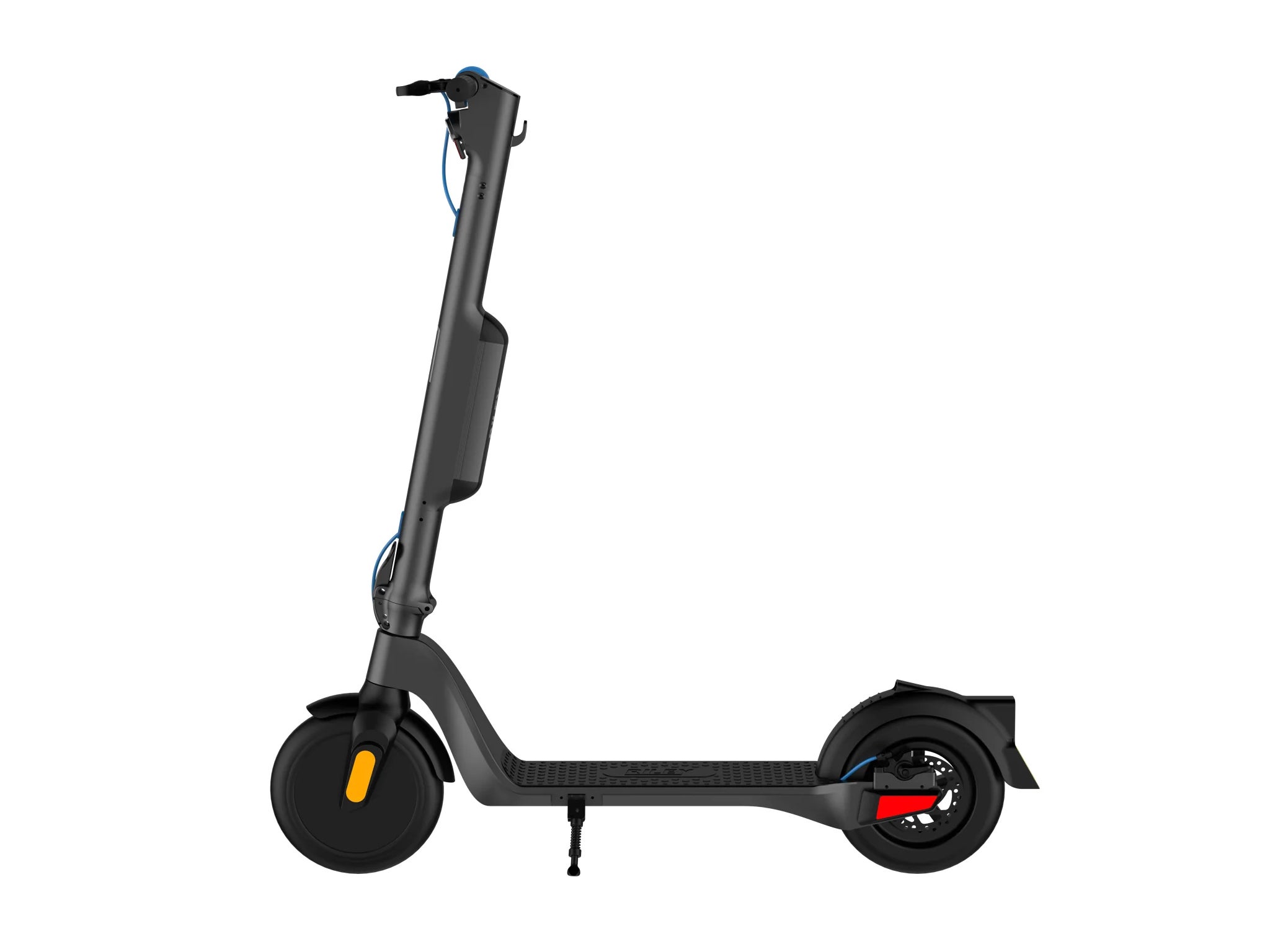
- Best: Budget electric scooter
- Weight: 15kg
- Size: 15cm x 113cm x 118cm/48cm
- Range: 24km
- Charging time: 2hr
- Power: 350W
- Tyres: 10in, air-filled puncture-resistant
- Why we love it
- Removable, replaceable battery
- One-thumb riding
- Electronic brakes
- Take note
- Average range
The British-designed Riley RS1 is the brand’s entry-level model. Unlike the truly folding Riley RS3 (£699, Currys.co.uk), this version it folds down like a traditional scooter.
What is loses in portability, it gains in comfort and stability: fewer moving parts makes the RS1 a more pleasant ride in general. The molded aluminium chassis feels rugged, while the 10in pneumatic tyres help to soften any bumps on your route. One-thumb acceleration and braking, plus an automatic cruise control which kicks in after a few seconds of constant throttle, makes it one of the easiest scooters to ride.
What sets this scooter apart from most others is its removable battery, which sits in the steering column. The RS1’s range is relatively short – riding at full speed took a huge dent out of the advertised 24km range – so the option to carry a second battery gives you peace of mind should your charge be running low.
Xiaomi Mi 1S
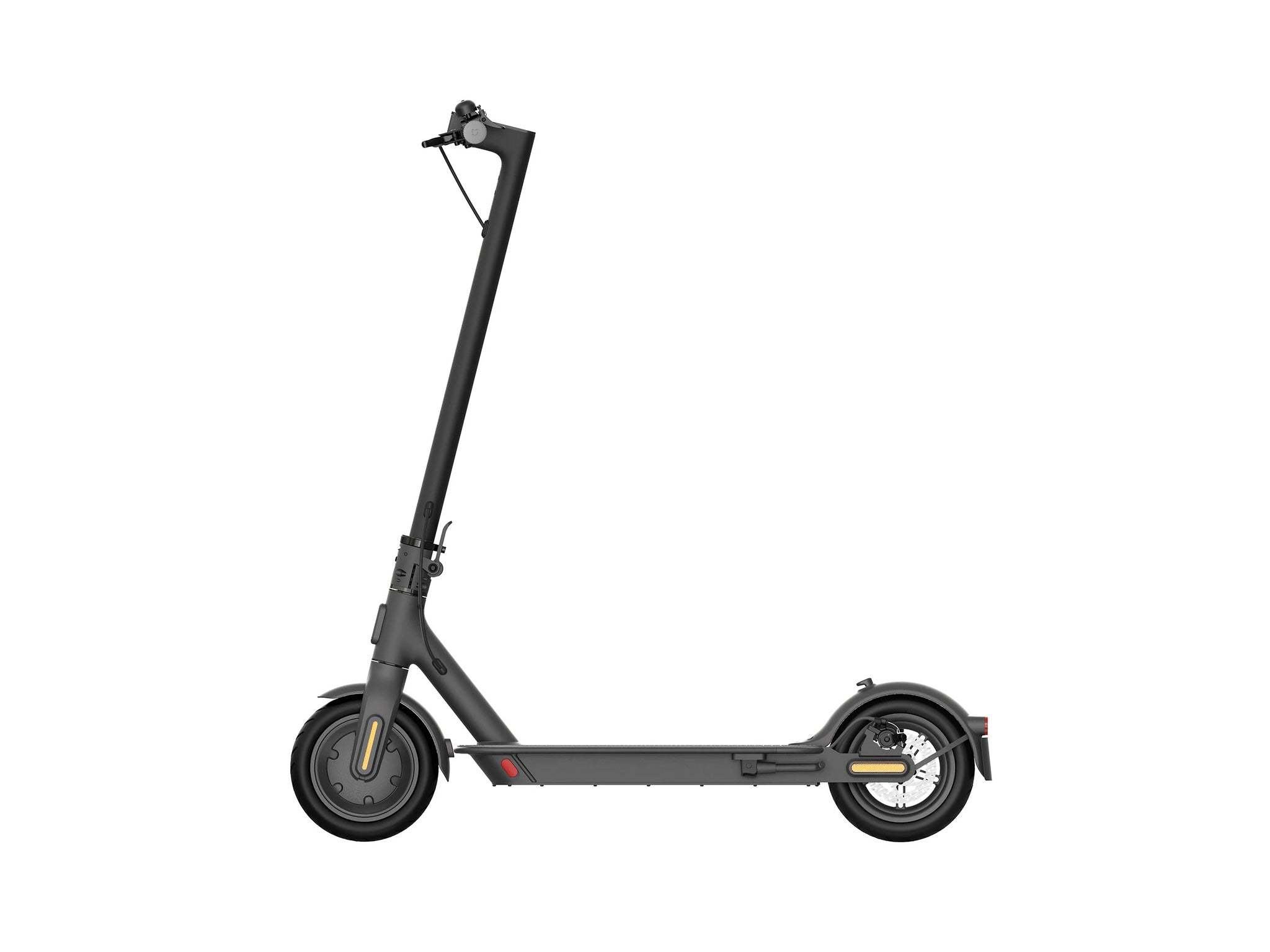
- Best: For teenagers
- Weight: 12.5kg
- Size: 110cm x 20cm x 110cm
- Range: 18.5 miles
- Charging time: 5.5 hours
- Power: 250W
- Tyres: 8.5in pneumatic tyres
- Why we love it
- Comfortable, air-filled tyres
- Lightweight and portable
- Take note
- Sluggish at top speeds
If you’ve ever taken a ride on an electric scooter before, chances are it was a Xiaomi. For a long time the most widely mass produced e-scooter on the planet, the Xiaomi M365 (or some variant) was the workhorse of many e-scooter rental apps. This is thanks to the Chinese scooter’s simple, low-cost construction and near-indestructible build quality. The Xiaomi Mi 1S is built around the blueprint of the M365, and redesigned for private ownership.
Gone are the hard-wearing rubber wheels, replaced with air-filled tyres for a more comfortable ride. At 12.5kg, the Xiaomi Mi 1S is easier to carry in one hand than every other scooter we tested – barring only the fractionally more lightweight Unagi Model One above (£899, Leisurelakesbikes.com). While the small motor feels sluggish when approaching its top speed, initial acceleration is delightfully snappy and responsive.
Xiaomi Mi Pro 2
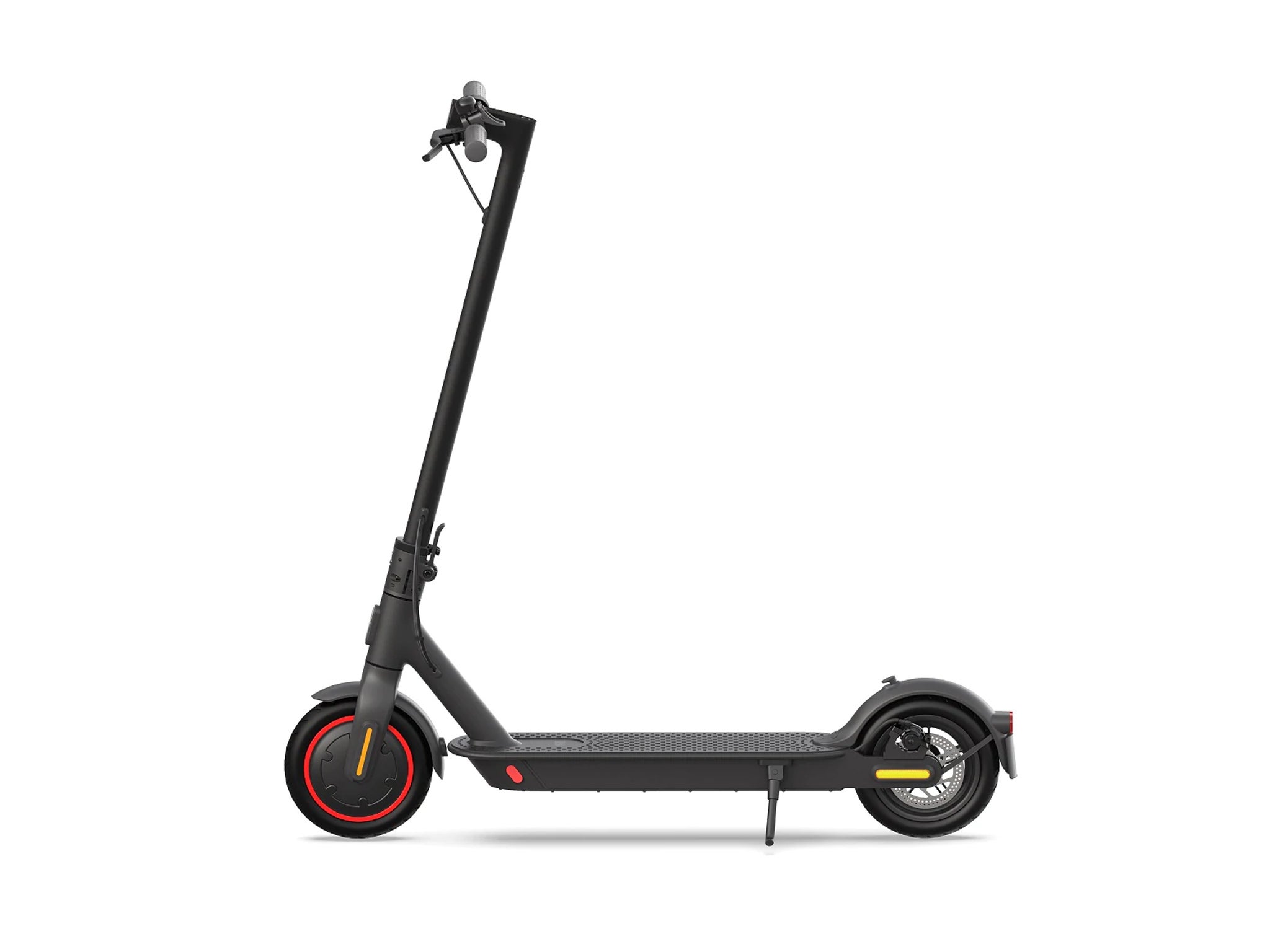
- Best: For adults
- Weight: 14.2kg
- Size: 113cm x 43cm x 49/118cm
- Range: 28 miles
- Charging time: 8.5 hours
- Power: 300W
- Tyres: 8.5in pneumatic tyres
- Why we love it
- Sturdy, comfortable ride
- Easy to control
- Great for heavier riders
- Take note
- Heavier than some e-scooters
Xiaomi’s more premium electric scooter is powered by a significantly punchier motor than its budget-level counterpart the Xiaomi Mi 1S (£449.99, Amazon.co.uk). Keep in mind that motor power doesn’t change the Xiaomi Mi Pro 2’s top speed – electric scooters sold in Europe are speed-limited to 15.5mph – it does improve performance on hills and with heavier riders.
The Xiaomi Mi Pro 2 is also a good deal larger than the more compact Xiaomi Mi 1S, which makes this scooter less portable but noticeably more stable. Smaller electric scooters can feel wobbly, but here the longer wheelbase allows for more balance and control, even when making tight turns at low speeds. The larger deck creates more room for battery storage too, giving it an impressive range for its weight.
Segway Ninebot Max G30E II
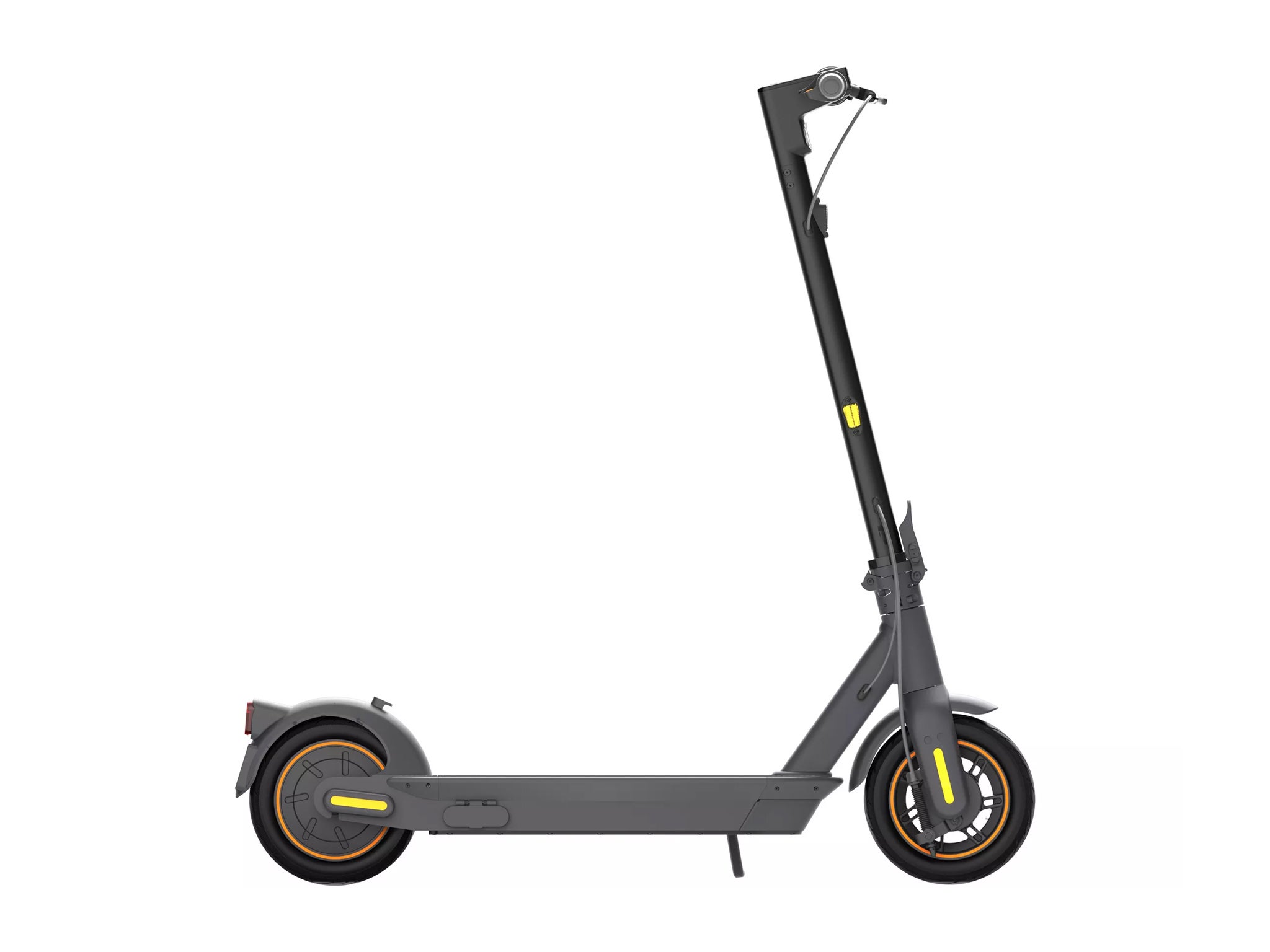
- Best: Long-range electric scooter
- Weight: 19.1kg
- Size: 47cm x 116cm x 120/53cm
- Range: 40 miles
- Charging time: 6 hours
- Power: 350W
- Tyres: 10in pneumatic tyres
- Why we love it
- Superb range
- Bright, full-colour LED display
- Take note
- Bulkier than some e-scooters
The Segway Ninebot Max G30E II is a beast of an electric scooter, designed to go as long as possible on a single charge and engineered to withstand even the harshest of riding conditions. This premium model introduces creature comforts such as softer tyres for more comfortable suspension and a bright, full-colour LED display showing speed, ride settings and battery level.
The best-in-class 40-mile range means you can ride it farther than any other scooter in our list, but this comes at the expense of the scooter’s portability when switched off. A low-torque pedestrian mode assists you when walking alongside the scooter, but lugging this 19kg lug up a flight of stairs is like moving a piano.
Why you can trust us
Steve Hogarty is an award-winning lifestyle journalist and travel writer with 20 years’ experience in the technology industry. He joined The Independent in 2021 as a technology critic for IndyBest where he covers anything with a chip in it, from phones, laptops, tablets and e-bikes to gaming, smart home and audio hardware.
Electric scooters FAQs
Are electric scooters legal in the UK?
Yes, but only under certain conditions. Trials of electric scooter rental services are currently taking place in cities across the country. It’s legal to ride these rental scooters within the area the scheme operates. However, the law has yet to catch up with how electric scooters are being used, so there are still some technical limitations on where you can ride privately owned e-scooters.
Private scooters can only be used on private land. If you use a private electric scooter on a public road the police can fine you for operating a motor vehicle without insurance or a licence, you can receive penalty points on your licence, and you could have your scooter impounded.
Legislation is in the works to formally classify electric scooters as a new vehicle class, which would make them legal to use on public roads.
Electric scooter road safety rules
General road safety laws apply when riding an electric scooter. You can be issued a fixed penalty notice for riding on the footpath. You can receive six penalty points and a fine for using a mobile phone while riding an electric scooter. Riding through red lights can result in £100 fine and points on your licence.
And if you’re found to be drunk or intoxicated while riding an electric scooter, you can technically face the same charges as when driving any other motor vehicle: fines, a driving ban and even jail time.
Since December 2021, electric scooters have been prohibited from being carried on TfL services, after defective batteries caused fire incidents.
The government has issued the following advice on the use of rental scooters:
- Though not a legal requirement, riders are advised to wear a helmet and fluorescent clothing while using an electric scooter
- Traffic signs with bike symbols, such as at cycle lanes and bus lanes, also apply to electric scooters
- Do not ride on the pavement
- Do not ride an electric scooter on a motorway
- Do not tow anything
- Do not use a mobile phone
- Do not carry a passenger
- Do not hang luggage from the handlebars
- Do not ride while intoxicated
The verdict: Electric scooters
For unbeatable all-round performance, top build quality and affordability, our choice of the best electric scooter is the Pure Air Pro. However, riders on a budget should consider the Riley RS1, a reliable and safe electric scooters costing less than £300.
Enhance your commute with our round-up of the best electric bikes
Voucher Codes








